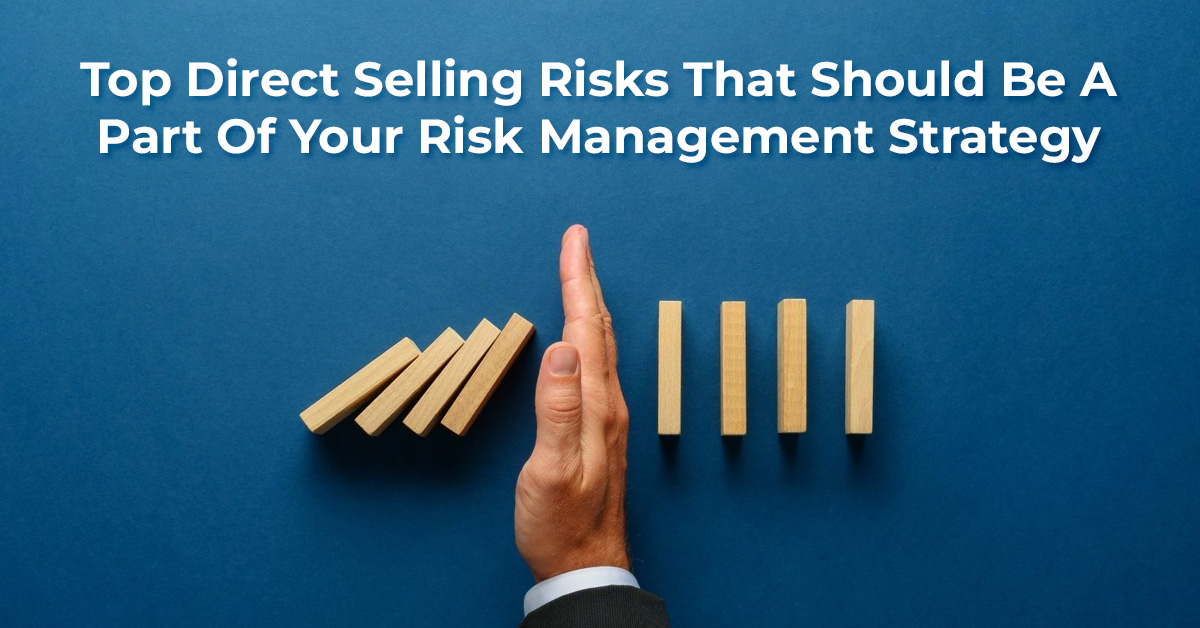
A risk management strategy is a plan of action that a direct selling business takes to protect itself from potential risks. There are several risks associated with direct selling business. It is crucial to take those into consideration to manage business proficiently.
In business, those might include the risk of fraud, the risk of product liability, and the risk of regulatory action.
You can find the most significant risk as product liability. If a direct-selling company sells defective a product, the company would be accountable for damages. Other risks include those associated with recruiting and managing a sales force, as well as the potential for fraudulent activity by employees or customers.
Read: What is the best MLM marketing strategy in 2023?
To alleviate these risks, direct-selling companies should have comprehensive product liability insurance in place. They should also have systems and controls in place to monitor and detect fraudulent activity. By taking these precautions, direct selling companies can help to protect themselves from risks of the potential loss.
There are many reasons why having a risk management strategy is important. The most important reason is that it can help you avoid potential problems and mitigate existing ones. A risk management strategy can help you identify and assess risks, and then develop plans to avoid or minimize them.
It can also help you keep track of your progress and ensure that your plans are effective. Further, you may also experience an important role in direct selling software. It is a crucial part of the direct selling
Risk management is important for businesses of all sizes, but it can be especially critical for small businesses. This is because small businesses often have limited resources and cannot afford to make mistakes. Apart from these, risk management strategies can help businesses avoid potential flaws and keep their operational activities on track.
Read: 10 Helpful Tips for Recruiting People into Direct selling business
Direct selling is a popular business model as it can be a more efficient and cost-effective way to reach customers.
However, direct selling can also be a risky business model, as it relies on personal relationships and face-to-face interactions. Thus, you may find difficulties in scaling up a direct-selling business. Customers may frequently show dissatisfaction with your products and services.
Since many companies are experimenting with new ways to direct selling, such as online sales, social media marketing, and other digital channels. Such initiatives are important to help companies reach more customers process.
To validate a theory, businesses in the direct selling industry typically measure three key indicators: customer satisfaction, customer acquisition, and customer retention. By surveying customers and measuring how likely they are to continue doing business with the company. The business focuses on how likely they are to refer others just to analyze how well their theory is being received.
Additionally, businesses track how many new customers they have acquainted. Further, they also focus on measuring customer retention rates, which serves as reliable proof of growth.
This is another risk where direct sellers force people to buy their products. Finally, there is the risk of not being able to sell the products that you have purchased. If you are unable to sell the products, you may be stuck with them and end up losing money. Therefore, you need to come up with marketing strategies to reduce the potential risk of loss.
In direct selling businesses, data analysis is critical to keep track of which products are selling well. Where customers are located, and what marketing strategies are working. By analyzing data, businesses can make customer-centric decisions. The further company gets the idea to allocate its resources where it can quickly maximize sales and profits.
In any business, there is always some level of risk involved. This is especially true in direct selling, where businesses often rely on a small team of salespeople to generate revenue. However, with a help of planned risk-reward analysis, businesses can minimize the risks and maximize the rewards of direct selling.
By understanding the potential risks and rewards of direct selling, businesses can make more informed decisions about how to grow their sales teams. With a clear understanding of the risks and rewards, they can create strategies to ensure profitable marketing efforts.
The most important lesson is that you have to be passionate about what you are selling. If you are not passionate about the product, you will not be able to sell it. Apart from these, you have to be able to track your inventory, orders, and customers. Since you must remember that it takes a lot of hard work and dedication to be successful.
Contingency planning is the process of creating a plan to prepare for and respond to potential risks. In the direct selling business, contingency planning can help you prepare for and manage potential risks that could impact your business.
Some of the challenges that you may face are an unexpected drop in sales, a change in regulations, or a natural disaster. But a well-crafted contingency plan can help you keep your business on track at all times.
One of the most important best practices is to focus on building a strong and dedicated team of salespeople. You need to train your team members to efficiently sell your products provide excellent customer service.
Read: What’s the value of direct selling and network marketing in 2023?
Additionally, it is important to have a result-driven marketing strategy to generate interest and demand for the products. Effective management and leadership are imperative to ensure the profitability of a direct-selling business. If you focus on these best practices, you may achieve a high level of success.
You may consider the above risk management strategies to run your direct selling business. This is the truth that challenges are everywhere and hence you may grow by evaluating the values of marketing. Apart from all these above, the selection of the right piece of direct selling software will also help you grow quickly.